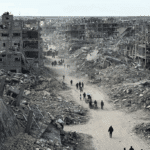Brussels, 17 July 2014 – Victims of human rights violations need to see justice being done to increase their confidence and participation in the justice processes. Today, International Justice Day is being celebrated throughout the world to encourage an emerging system of international criminal justice. Since 1996, Avocats Sans Frontières (ASF) provides active support to the prosecution of international crimes before national courts of the affected states.
July 17 is the anniversary of the adoption of the Rome Statute in 1998, which created the International Criminal Court (ICC), the first permanent international court to prosecute individuals alleged to be responsible for war crimes, genocide and crimes against humanity.
The ICC’s performance and achievements are being met with more and more scepticism by certain State parties, who are withholding the resources necessary for the ICC to function, or who are giving existing regional African courts jurisdiction over international crimes, thus protecting heads of states and governments within the African Union from ICC prosecution.
Despite this current trend, the evolving consensus within the international community to prevent and punish the most serious crimes is real. The adoption of the Rome Statute sends a clear message: failure to investigate and prosecute such crimes at the national level will no longer be tolerated.
In effect, the Rome Statute reinforces the central role of national criminal justice institutions. It does not merely reiterate a general competence of states to exercise criminal jurisdiction over such crimes, but stipulates that it is a duty of states to do so.
This way, the prosecution of international crimes finds its way back to where it belongs: before national courts of the affected states. National proceedings will be more meaningful to victims who have suffered directly at the hands of perpetrators and help to restore dignity to these victims; they are likely to have a larger impact on restoring confidence in the national institutions of justice and the rule of law, and produce actual change in the lives of rights-holders.
The power of justice to bring a measure of peace and restoration to the thousands of children, women and men who have been made victims by heinous crimes can not be emphasized enough. Victims need justice but also need to see justice being done to increase their confidence and participation in the justice processes, thereby contributing to a larger culture in which humanitarian law and human rights law are better integrated in the fabric of society and therefore more adhered to.
ASF will keep on contributing to this objective by facilitating the work between local populations and tribunals, and developing a variety of strategies to make the right of access to justice a reality for the most vulnerable sectors of the world’s population.
This is being undertaken notably in the framework of an international justice project entitled Crossroads. This project financed by the European Union covers Burundi, Colombia, DR Congo, Guatemala, Nepal, and Uganda.
Minova case, Goma, DR Congo © ASF – J. Songa
https://www.facebook.com/justicematters.17july



